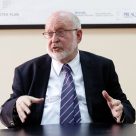
Sheldon Fink
Chairman & CEO of PBI Aqaba Industrial Estate
Industry / Jordan
“We will have $1b of investment under management by 2019”
The Aqaba International Industrial Estate (AIIE) is a premium location in Jordan manufacturing and logistics, located next to Aqaba Airport and 15km from Jordan’s only seaport in the Aqaba Special Economic Zone (ASEZ). Sheldon Fink is chairman and CEO of PBI Aqaba Industrial Estate, the UK-registered, 50% Turkish, 50% US-owned company that operates the facility.
When do you believe you’ll reach your $1 billion milestone?
Today, we’re at $600 million and have created 2,500 jobs, but based on total signed contract and buildings under construction, we will have $1 billion of investment under management within the next year. For example, the US Agency for International Development has now developed programs that go straight to private business. We’re working with them on a $100-million deal, where USAID has agreed in principle, and we hope to complete the deal by the end of the year. Until now, big projects here were up to $50 million, and now we have $200- or $300-million projects in the pipeline.
You have been considering two possible expansion projects, one near the new port, the other at Quaira. What progress can you share with us?
We had to choose between the two sites, because we can’t do both at one time. We signed an outline agreement for Quaira at the World Economic Conference at the turn of the year, and operations could start in the beginning of 2020. Moreover, we are working together with ASEZA to close a deal with an anchor investor from Germany.
You’ve mentioned hi-tech as the type of companies you want to attract, as well metals, security, garments, plastic and food industries that are already here. What areas are your particular priorities?
We are trying to attract industries that have hi-tech products, as well as producers of low-tech products that use high-tech manufacturing. We have one company that makes special kinds of LED lighting: streetlights but with much higher efficiency and longer life, as well as greenhouse growth lighting. A Chinese company we found that developed this technology started up here a couple of months ago. They did a first small series of streetlights locally, and now installed lights in a model greenhouse in a project supported by the king of Norway and the king of Jordan, called the Sahara Forest Project.
Has the relaxed rules-of-origin deal with the EU help?
The rules of origin from the original agreement were in favor of Europe against Jordan. There were many issues but especially the requirement for a high percentage of European source materials, even though Europe is no longer a competitive producer of such materials. Jordan could never get to a point where they could sell anything. Now, when the Europeans relaxed the rules of origin, they tied it to locations and the employment of Syrian workers.
How do you think Jordan could benefit from better communication about its safety, its opportunities, and where the country is headed?
Jordan should make use of foreign investors, together with the entrepreneurial part of the Jordan business community in communicating to potential new investors. Till now Jordan, has been communicating through government officials. But you can’t just say this is a great place; you have to list the problems and say this is how you overcome them. The best approach is to get investors to come here, then it will be much better than they expect. The reality is better than the story.
